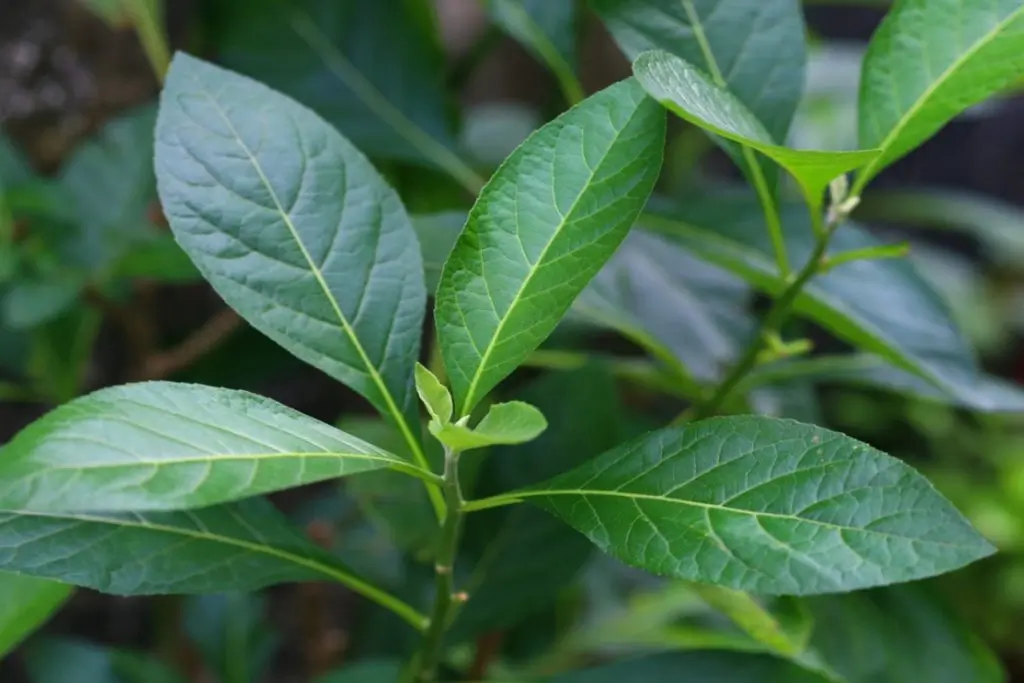
Bitter leaf, also called Onugbo in Igbo, Ewuro in Yoruba, or Etidot in Efik, is a popular herb in Africa with several uses in food, medicine, and cosmetics. However, what exactly is Onugbo leaf, and what are its health benefits and side effects?
This article explores the nutritional and phytochemical aspects of bitter leaf and its various health benefits, side effects, and precautions. Additionally, we will discuss how to use the Bitter Leaf for different health-related issues and get the most out of the Onugbo leaf. Let’s begin!
What is Bitter Leaf?
Bitter Leaf is a small shrub from the daisy family (Asteraceae). It is native to tropical Africa but is also cultivated in other parts of the world, such as Asia, South America, and the Caribbean.
The Leaf has dark green leaves that are elliptical in shape; they are very bitter, which is why it’s called “Bitter Leaf”. The plant also has rough bark, small purple flowers, and brown seeds. The plant can grow up to 2–5 m in height and does well in moist soils.
The Leaf has many common names in different languages and countries. Some of them are:
- Onugbu (Igbo)
- Ewuro (Yoruba)
- Etidot (Efik)
- Oriwo (Edo)
- Awonwono (Akan)
- Ndoleh (Cameroon)
- Omubirizi (Uganda)
- Ebichaa (Ethiopia)
- Umubilizi (Rwanda)
Nutritional Facts of Bitter Leaf (Onugbu)
Bitter Leaf is rich in nutrients and Vitamins such as vitamins A, C, E, K, B1, B2, B3, folate, calcium, iron, magnesium, potassium, zinc, copper, manganese, selenium, and fibre.
Bitter Leaf also contains various phytochemicals that have medicinal properties. Some of them are:
- Flavonoids
- Phenolic acids
- Alkaloids
- Saponins
- Tannins
- Terpenoids
- Steroids
- Glycosides
Health Benefits of Bitter Leaf
One of the most common ways to use Bitter leaf for health purposes is to extract its juice, make a concoction from its leaves, or cook “Bitter Leaf Soup – Onugbu Soup and eat it with Fufu or Eba (Garri). Bitter leaf juice or extract has many benefits, such as:
Bitter Leaf for Diabetes
Bitter leaf can help treat diabetes by lowering the blood sugar levels in the body and improving insulin sensitivity. Bitter leaf contains phytochemicals that can stimulate insulin secretion from the pancreas, enhance glucose uptake by the cells, inhibit glucose absorption from the intestines, reduce glucose production from the liver, and modulate glucose metabolism in the body.
Bitter leaf can also prevent or reduce the complications of diabetes, such as oxidative stress, inflammation, infection, neuropathy, nephropathy, retinopathy, or cardiovascular disease.
To use bitter leaf for diabetes, one can drink bitter leaf juice or extract daily before meals or as prescribed by a doctor. Alternatively, you can chew the leaves fresh or add them to salads or soups. Monitor your blood sugar levels regularly and consult a doctor before using the leaf to treat diabetes.
Bitter Leaf for Weight Loss
Bitter Leaf can help with weight loss by suppressing appetite, increasing metabolism, burning fat, and reducing water retention. Bitter Leaf contains phytochemicals that can reduce hunger hormones, such as ghrelin and leptin, and increase satiety hormones, such as peptide YY and glucagon-like peptide-1.
It also contains phytochemicals that can boost thermogenesis (heat production) and lipolysis (fat breakdown) in the body. Bitter Leaf also contains diuretic compounds that can flush out excess water and salt from the body.
Drink the juice or extract from the Leaf daily before or after meals to use the Leaf for weight loss. Following a balanced diet and exercising regularly is advisable to achieve the best weight loss results.
Bitter Leaf for Fertility
Bitter Leaf contains compounds and antioxidants that promote hormonal balance and reproductive health for fertility improvement. It enhances ovulation and sperm production by regulating hormones like oestrogen and testosterone.
The antimicrobial properties of the Leaf prevent infections in the reproductive tract that cause infertility. Through hormonal support, sperm enhancement, and infection prevention, bitter leaves can aid conception when taken daily as juice, extract, or food.
However, it’s best to consult a doctor if you have fertility issues for help instead of using Onugbu Leaf as a treatment for infertility.
Bitter Leaf for Malaria
Bitter Leaf can help prevent and treat Malaria by killing the parasite, reducing the symptoms, and boosting the immune system. Bitter Leaf contains phytochemicals that have antimalarial activity against different strains of Plasmodium parasites.
Bitter Leaf also contains phytochemicals that have antipyretic (fever-reducing), analgesic (pain-relieving), antiemetic (vomiting-preventing), antidiarrheal (diarrhea-stopping), and anti-anemic (blood-boosting) effects.
To use bitter Leaf for Malaria, you can drink the juice or extract from the Leaf daily before meals or as prescribed; however, it’s best to visit a doctor or health professional when you’re down with Malaria instead of self-medicating or relying on just Onugbu leaf.
Bitter Leaf for High Blood Pressure
Bitter Leaf can help lower blood pressure and prevent or reduce the complications of hypertension. It contains antihypertensive phytochemicals that can relax and dilate the blood vessels, reduce the resistance and force of blood flow, and regulate the renin-angiotensin-aldosterone system (a hormonal system that controls blood pressure).
Onugbu Leaf also contains phytochemicals with cardioprotective effects that can prevent or reduce heart and blood vessel damage caused by high blood pressure.
Constantly monitor your blood pressure and consult a doctor before using bitter Leaf as an alternative or treatment for high blood pressure.
Bitter Leaf for Cancer
Bitter Leaf contains powerful phytochemicals that can help prevent and treat cancer through numerous mechanisms, including:
- Induces apoptosis (cell death) in cancer cells to inhibit tumour growth
- Suppresses angiogenesis (blood vessel formation) and metastasis (spread) of tumours
- Enhances DNA repair and stability in normal cells
- Boosts effects of chemotherapy drugs and radiation therapy
- It has chemopreventive effects to prevent cancer initiation and progression by neutralising carcinogens, regulating hormones, and activating the immune system.
In essence, the unique phytochemical profile of Onugbu Leaf enables it to selectively target cancer cells and block their growth and progression through multiple channels while also protecting healthy cells and enhancing conventional treatments. Consuming the Leaf can helps inhibit tumour development and augment cancer therapy.
Bitter Leaf for Liver Detoxification
Bitter leaf can help with liver detox by scavenging toxins, enhancing antioxidant enzymes, reducing oxidative stress, inhibiting inflammation, stimulating bile secretion, and promoting liver regeneration. It contains phytochemicals that have hepatoprotective and detoxifying effects that can protect and cleanse the liver.
Bitter leaf also contains phytochemicals that have choleretic (bile-stimulating) and cholagogue (bile-expelling) effects that can facilitate the digestion and elimination of fats and toxins from the body.
Bitter Leaf for Kidney Stones
Bitter leaf can help prevent and treat kidney stones by increasing urine output, flushing out waste products, reducing inflammation, preventing kidney stone formation, and possibly dissolving kidney stones. The leaf contains phytochemicals with nephroprotective and diuretic effects that can protect and flush the kidneys.
Bitter leaf also contains phytochemicals with anti-inflammatory and antiseptic effects that can reduce the pain and infection caused by kidney stones. They also contain phytochemicals that have antilithiatic (stone-preventing) and litholytic (stone-dissolving) effects that can inhibit the crystallisation and aggregation of minerals and salts in the urine and dissolve existing kidney stones.
Bitter Leaf for Skin Rash
Bitter leaf can help prevent and treat skin rashes by soothing, healing, protecting, and beautifying the skin. The leaf contains phytochemicals with anti-inflammatory and antihistamine effects that can reduce the itching, burning, pain, swelling, and redness caused by skin rashes.
The leaf also contains phytochemicals with wound-healing and antimicrobial effects that promote healing and prevent skin rash infections. It contains phytochemicals that have antioxidant and photoprotective effects that can protect the skin from oxidative damage and sunburn.
Bitter Leaf for Hair Growth
Bitter leaf can help with hair growth by nourishing, strengthening, protecting, and stimulating the hair follicles and shafts. The leaf contains phytochemicals that have hair growth-promoting effects that can increase blood circulation to the scalp, provide essential nutrients to the hair follicles, enhance keratin synthesis in the hair shafts, inhibit the 5-alpha reductase enzyme that converts testosterone to dihydrotestosterone (DHT), which causes hair loss, and activate hair growth factors in the scalp.
It contains phytochemicals that have hair health-improving effects that can prevent or treat hair problems such as dandruff, dryness, brittleness, split ends, or breakage.
Bitter Leaf for Constipation
Bitter leaf can help constipation by stimulating bowel movement, increasing intestinal motility, enhancing digestive enzymes, reducing inflammation, and balancing intestinal flora. Onugbu leaf contains phytochemicals with laxative and digestive effects that can relieve constipation and improve digestion.
Bitter Leaf for Stomach Ache & Diarrhoea
Bitter Leaf can naturally relieve stomach aches through its medicinal phytochemicals. It tackles discomfort on multiple fronts: antispasmodic compounds reduce cramps and pains, while anti-nausea effects prevent vomiting. The leaf also stops diarrhoea, neutralises excess stomach acid, and helps heal ulcers or inflammation.
The leaf’s anti-spasmodic, pain-blocking, and stomach-coating properties bring soothing relief for abdominal discomfort without side effects. A few sips of bitter leaf tea can calm an upset stomach and restore normal function.
Side Effects of Bitter Leaf (Onugbu Leaf)
Bitter leaf is generally safe and beneficial for your health. Still, it may also have some side effects that should be considered before use. Some of these are:
- Bitter taste and loss of appetite: It has a bitter taste that may not be palatable for some people. The leaf may also cause a loss of appetite due to its effect on the taste buds and the digestive system. This may lead to weight loss or malnutrition in some cases.
- Hypoglycemia and hypotension: Its hypoglycemic (blood sugar-lowering) and hypotensive (blood pressure-lowering) effects may benefit people with diabetes or hypertension. Still, it may also cause problems for people with regular or low blood sugar or blood pressure levels. This may lead to symptoms such as dizziness, weakness, fatigue, headache, or fainting in some cases. Reduce Onugbu usage and check your blood pressure levels regularly to avoid this.
- Allergic reactions and drug interactions: Bitter leaf may cause allergic reactions in some people who are sensitive or intolerant to it. In some cases, this may lead to symptoms such as rash, itching, swelling, breathing difficulty, or anaphylaxis (a severe allergic reaction).
Bitter leaf may also interact with some drugs with similar or opposite effects on the body. This may lead to increased or decreased effectiveness of the medicines or an increased risk of side effects or toxicity in some cases. Some of the medications that may interact with bitter leaf are:
- Antidiabetic drugs
- Antihypertensive drugs
- Anticoagulant drugs
- Antiplatelet drugs
- Antimalarial drugs
- Chemotherapy drugs
- Immunosuppressant drugs
- Hormonal drugs
Pregnancy and breastfeeding
Bitter Leaf may have some effects on pregnancy and breastfeeding, and the Leaf may sometimes affect hormonal balance, uterine contraction, foetal development, milk production, or milk quality.
To avoid any potential risk or harm to the mother or the baby, one should avoid using Onugbu Leaves during pregnancy and breastfeeding unless advised by a doctor.
How to Use Bitter Leaves
Bitter Leaf is widely used as a vegetable and Herb in African cuisine. Bitter Leaf can be eaten raw, cooked, or dried. Bitter Leaf can be added to soups made with meat or fish. They can also be used to make tea or juice. Some of the popular uses of the Leaf include:
- Onugbu soup (a Nigerian soup made with bitter Leaf, palm oil, meat, fish, stockfish, crayfish, pepper, and ogiri)
- Ndole (a Cameroonian dish made with bitter Leaf, peanuts, palm oil, meat, fish, shrimp, garlic, ginger, and spices)
- Ewuro (a Yoruba dish made with bitter Leaf, locust beans, palm oil, pepper, salt, and water)
- Tea
Medicinal Uses of Bitter Leaf
Bitter Leaf is widely used as an herbal medicine in traditional African medicine. Bitter Leaf can treat various diseases and conditions, such as malaria, fever, worm infestation, diabetes, hypertension, ulcers, cancer, liver, kidney, skin, hair, and digestive problems.
The Leaf can be used in different forms and dosages, such as juice, extract, decoction, infusion, powder, capsule, or tablet. It can be taken orally or applied directly to the body.
Some of the common ways to use bitter Leaf as an herbal medicine are:
- Chew fresh leaves or add them to dishes like soups and salads. This allows you to access the raw phytochemicals.
- Make an extract or juice by soaking the leaves in water for several hours, then drink it for a more potent medicinal effect.
- Grind the dried leaves into powder and mix with water or honey. The powder provides a convenient way to take the Leaf daily.
- Look for capsules or tablets containing bitter leaf extracts. Useful for standardised doses.
- Apply bitter leaf juice directly to the skin and hair.
Other Uses of Bitter Leaf
The Leaf can also be used for other purposes unrelated to food or medicine. Such as:
- As a pesticide, The Leaf can repel or kill insects that may damage crops or plants. It can be sprayed on the plants or mixed with the soil.
- As a dye, The Leaf can produce a natural dye that can colour fabrics or materials. The Leaf can be boiled with water and vinegar and soaked in cloth or other material.
- As a soap, Onugbu Leaf can make a natural soap that can clean the skin or hair. Mix it with ash and water and boil it until it forms a thick paste.
Frequently Asked Questions
How Do I Store Bitter Leaf?
You can store the fresh leaf in a plastic bag, container, or refrigerator for several days.
Is Bitter Leaf Harmful to the Kidney?
Yes. It is good for the kidneys and liver, as it helps detoxify them.
Is Bitter Leaf Good for Weight Loss?
Yes, it may help with weight loss due to its high fibre content and ability to boost metabolism.
What Does Bitter Leaf Taste Like?
It has a strong, bitter taste.
How Can I Make Bitter Leaf Less Bitter?
- Soak the leaves in water with salt for a few hours before cooking.
- Squeeze out the excess water from the leaves before cooking.
Conclusion
Onugbu Leaf is a versatile herb with many uses and benefits for health and well-being. It can provide various nutrients and phytochemicals to prevent and treat various diseases and conditions.
Bitter (Onugbu) leaf can also enhance the taste and quality of food and beverages. It can also be a natural pesticide, dye, or soap.
However, as mentioned above, it may also have some side effects and precautions that should be considered before using it. Therefore, use Onugbu leaf moderately and consult a doctor before using it for medicinal treatment.






